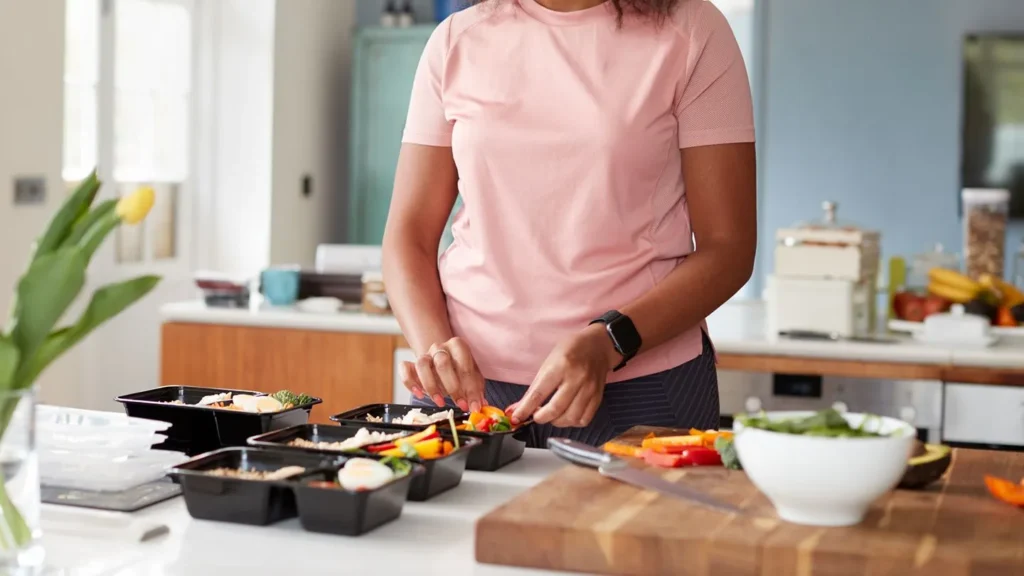Read time : 3 minutes

Have you ever caught yourself saying, “I always buy food from outside because I’m just too busy to cook”? Trust me—you’re not alone. As a nutrition professional, I hear this all the time during consultations. Life gets hectic—between work, family responsibilities, social commitments, and the daily hustle, the thought of preparing meals every single day can feel overwhelming.
But here’s the reality: relying on fast food, fried snacks, and takeaways might feel convenient today, but over time, it can take a toll on your health. Research continues to show that frequent consumption of ultra-processed or outside meals is strongly associated with weight gain, poor heart health, and even a higher risk of non-communicable diseases like diabetes and hypertension.
That’s exactly why meal prepping is one of the best habits you can build to support your health, save time, and reduce unnecessary spending.
What Exactly is Meal Prepping?
Meal prepping is simply planning and preparing your meals in advance. Think of it like setting yourself up for success before the week gets hectic. It could mean:
- Cooking your stews, soups, or sauces in large batches and refrigerating or freezing portions.
- Pre-cooking grains like rice, quinoa, or pasta ahead of time.
- Washing, chopping, and portioning vegetables or fruits for easy use.
- Preparing grab-and-go breakfasts or snacks like overnight oats or roasted nuts.
- It doesn’t have to be complicated—it just needs to work for your schedule.
Why Meal Prepping Works (and Why It’s So Popular)
- You Eat Healthier Without Trying Too Hard: Research shows we’re more likely to eat nutritious foods when they’re ready and waiting. Homemade meals often contain fewer added salts, sugars, and unhealthy fats.
- It Saves Time: One big cooking session can provide multiple meals. No more rushing home wondering what to cook or wasting time on long lines for food.
- It Saves Money: Buying ingredients in bulk and reducing the number of takeaway meals means serious savings by the end of the month.
- Helps with Portion Control: Pre-portioning meals allows you to avoid overeating, supporting weight management and healthier digestion.
What Does the Research Say?
It’s not just advice from your friendly neighborhood nutritionist—there’s actual science behind this.
A 2017 study published in the International Journal of Behavioral Nutrition and Physical Activity found that people who planned their meals in advance were more likely to eat healthier diets, have greater food variety, and were 33% less likely to be overweight.
Another 2021 review published in Nutrients highlighted that meal preparation helps busy people follow healthier diets with less stress, especially when juggling demanding work schedules.
Getting Started: Practical Tips for Busy People
- Start Small: You don’t need to prep an entire week. Start with 2-3 days and build confidence.
- Cook Versatile Meals: Meals like tomato stew, soups, or grilled chicken work well because you can pair them with different carbs (rice, yam, or plantains).
- Prep Ingredients, Not Just Meals: Sometimes chopping onions or seasoning meat ahead is all you need to make cooking faster.
- Use Proper Containers: Airtight, BPA-free containers help keep your food fresh and organized.
- Batch Cook Snacks Too: Roasted groundnuts, sliced fruits, or vegetable sticks can help reduce trips to the snack shop.
Sample 3-Day Meal Prep Idea
- Lunches: Grilled fish or chicken, steamed vegetables, and brown rice.
- Dinners: Prepared garden egg or tomato stew with boiled yam or plantain.
- Snacks: Fresh fruits, roasted peanuts, or yogurt with granola.
Final Thoughts
Busy life doesn’t mean you have to give up on good nutrition. Meal prepping empowers you to take charge of your health with minimal stress. Remember, small consistent steps make the biggest difference. Start where you are, use what you have, and grow from there.
Preventive Healthcare is Medicine—and it starts with your plate.